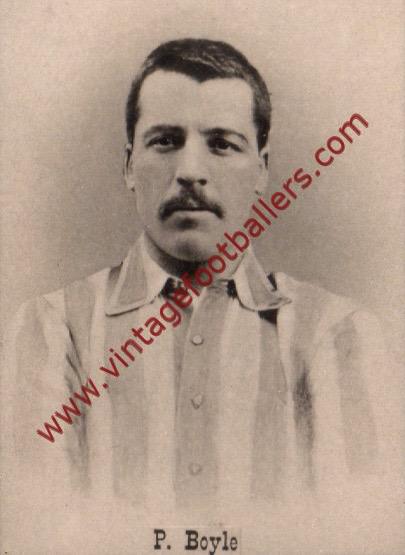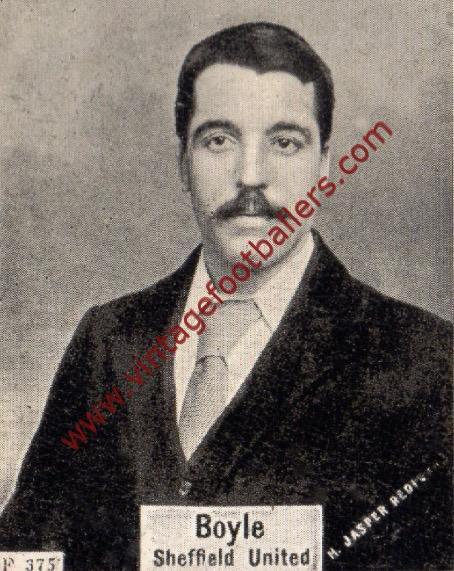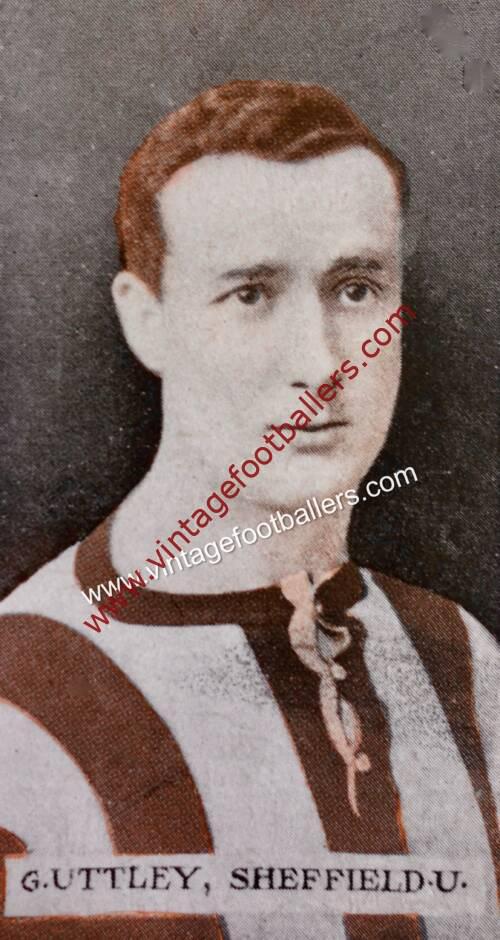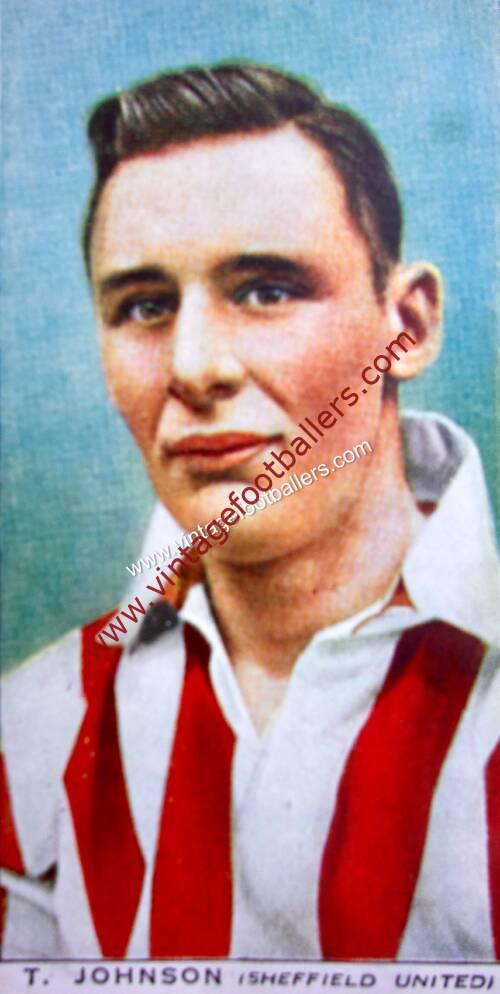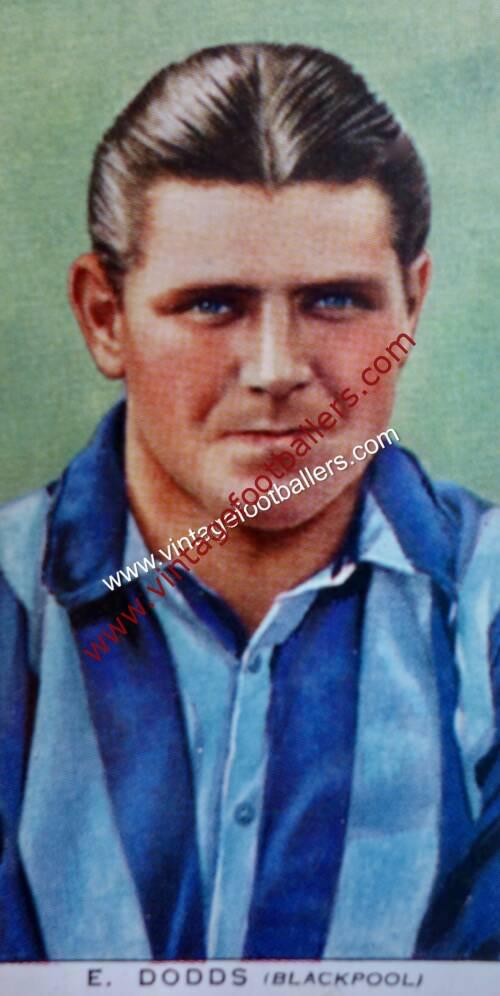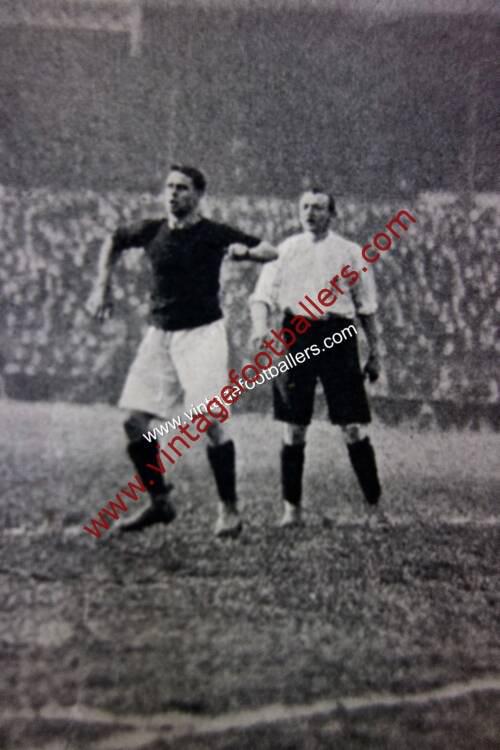Please choose your photo size from the drop down menu below.
If you wish your photo to be framed please select Yes.
Note: 16″x 20″not available in a frame.
Images can also be added to accessories. To order please follow these links
£8.95 – £49.95
Please choose your photo size from the drop down menu below.
If you wish your photo to be framed please select Yes.
Note: 16″x 20″not available in a frame.
Images can also be added to accessories. To order please follow these links
Carlingford, Ireland born left back Peter Boyle was a “robust” player with top class kicking and a fine tackle who proved a determined opponent, it was with Coatbridge Gaelic that Boyle’s footballing career began in 1894. He moved to the big local team, Albion Rovers in April 1895 and from there to Sunderland, at that time a dominant force in English football in December 1896, making his Football League debut against Blackburn Rovers that same month. In his first season however the club struggled, with Boyle still finding his feet he played just five League games, and Sunderland were forced to take part in the end-of-season promotion/relegation Test Matches. With Boyle in the team they lost one and drew one of the first two matches. Boyle was dropped for the last two games of the series, and it was only thanks to a 2-0 win over Newton Heath in the final match that their position in the top flight was maintained – a status they held until 1958!
Improvement was virtually immediate, as Sunderland finished runners-up to Sheffield United in the 1897-98 season, Boyle taking the field in 23 out of the 30 possible games. The following season Boyle once again found himself out of the team, and he played just once, in a 3-0 win over Bury in October, before a mid-season transfer to Sheffield United for £200 in December 1898 after 33 appearances. To thumb his nose in the direction of Roker Park, Peter Boyle finished his first season in Sheffield United with an FA Cup winner’s medal, as he played in a 4-1 FA Cup Final win over Derby County at The Crystal Palace in April 1899. The following season he just missed out on a League title winner’s medal, Sheffield United finishing just two points behind Aston Villa in the race for the League title.
Although the 1900-01 season brought a disappointing League campaign, Sheffield United finishing in a lowly fourteenth place, they did reach the FA Cup Final once again, losing out to Southern League Tottenham Hotspur (the only non-Football League winners since the League’s formation in 1888). The season also brought Boyle’s first international recognition; the Irish FA, realising his place of birth, including him in the team which lost 3-0 to England at The Dell, Southampton in March 1901.
The following season brought a second cap, once again against England, as Boyle returned ‘home’ for a 1-0 defeat in Belfast. He could have added further caps to his collection but on several occasions rejected call-ups to turn out for The Blades. Once again The Blades reached the FA Cup Final, this time requiring a replay to beat Southampton 2-1 after a 1-1 draw at The Crystal Palace. The star of the Sheffield United at this time was undoubtedly goalkeeper Willie “Fatty” Foulkes, but he was undoubtedly helped out by accomplished defenders such as Boyle playing in front of him.
The 1903 Home Nations campaign was undoubtedly Ireland’s most successful up to that point that saw Ireland break the England-Scotland monopoly, Boyle playing in 2-0 wins over Wales and Scotland – but missing the 4-0 defeat to England. The title was shared three ways for the first time in its history between the English, Scots and Irish. On the domestic front Sheffield United ran the League Championship close, eventually finishing fourth with local rivals Wednesday claiming the title.
The 1903-04 season was Boyle’s last with Sheffield United, and also saw him win his fifth and final cap, in a 3-1 defeat by England at Solitude, Belfast in March 1904. After 184 appearances for The Blades, scoring once against Wolves in October 1899, Boyle moved back to his adopted Scotland in May 1904, signing for Motherwell for £100. In 14 games he could do little to stop them finishing bottom of the Scottish First Division, and after just one season Boyle returned to the Football League in August 1905 with Clapton Orient.
It was an unspectacular season for the club, as they finished 17th in the Second Division, just missing out on having to apply for re-election, Boyle making 13 appearances. From Orient Boyle moved back to the north of England, taking in a succession of non league clubs, Wigan Town in August 1907, Chorley in November 1907, Eccles Borough that December, before joining York City as player-manager in 1912. The club had just turned professional and had joined the Midland League, but Boyle was replaced by Tommy Collier later the same season.. During the Great War Boyle served in the Army at Suvla Bay, Gallipoli.
Following the end of his playing career Boyle worked as a miner at Brodsworth Colliery where he also coached the colliery football team, Brodsworth Main, now Brodsworth Welfare. His son Tommy Boyle would also go on to play for Sheffield United with whom he too won an FA Cup winners medal in 1925.
| Weight | N/A |
|---|
